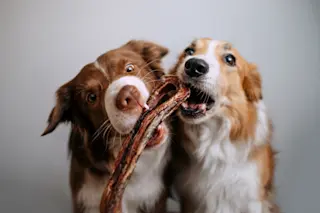You’ve probably come across the theory that canines can sniff out people’s personalities. But a new study in PLOS ONE, finds that both dogs and wolves do not assess individual people as “generous” or “selfish” in their direct and indirect interactions with those individuals. Positioned to inspire new ideas about the ways that dogs and wolves interact with others, the findings could improve our understandings of our furry friends.
Scientists tend to agree that an animal’s ability to form its own assessments of others contributes to its capacity for cooperation. In fact, some scientists actually suggest that canines, thanks to their clear ability to cooperate with humans, must measure individual people not only through their direct interactions with those individuals, but also their indirect observations of those individuals.
All that said, the research on these abilities remains shaky. To add to the confusion, scientists still struggle with whether these talents ...















